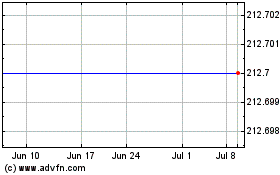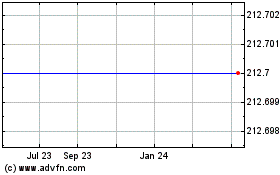CVS Caremark Corp. (CVS) reported second-quarter earnings at the
high end of its expectations, as the drugstore's four-year-old
merger with pharmacy-benefits manager Caremark is beginning to look
less like an albatross.
Nonetheless, sales at CVS stores were at the low end of views,
especially in the front end of the store, where they barely rose
once the benefits of a later Easter are stripped away. In fact,
those results fell well behind what Walgreen Co. (WAG), the No. 1
pharmacy in terms of locations, has posted, and even lag
once-woebegone No. 3 Rite Aid Corp. (RAD), which is finally
starting to show strength after years of deep troubles.
"Let me put this one to bed: We have not lost our focus on the
retail business," Chief Financial Officer David Denton told Dow
Jones Newswires. Its competitors "had a rough patch" at retail and
are rebounding nicely from that, and Walgreen has added product
categories to its stores that CVS already had on the shelves.
Denton said CVS has been "very disciplined" in its advertising
and promotional activities, targeting its best customers to make
them a bigger boon to the stores. He said the drugstores aren't
chasing sales for sales' sake.
CVS's hybrid business model benefited from increased revenue in
its drug management business. Larry Merlo, recently promoted to
chief executive, has pledged to make things right at Caremark and
has rebuffed the calls of some company followers to admit the 2007
merger of CVS and Caremark under the previous regime was a mistake
and to break them apart.
Caremark has won large contracts, most notably at the expense of
competitor Medco Health Solutions Inc. (MHS), which recently agreed
to be bought by larger PBM rival Express Scripts Inc. (ESRX) in a
deal that Wall Street is pricing as if it has little chance for
regulatory approval. Specifically, Caremark will take over the PBM
contract for 5 million federal government workers and also roughly
350,000 members of the California Public Employees' Retirement
System, or Calpers.
Though he declined to comment on the chances for approval of the
Express Scripts merger with Medco, Merlo said Caremark can compete
with that combination and opportunities still exist for Caremark to
win more new contracts.
CFO Denton said in the interview that, although like Merlo he
wouldn't speculate on whether the deal with pass the sniff test at
the Federal Trade Commission, but he said from a financial
standpoint the way Wall Street has priced the deal may reflect a
long closing process more so than a doubt about eventual success.
He said the large discount Medco is fetching compared to the
Express Scripts offer value may largely be due to the "time value
of money," given how long investors may feel the deal will take to
close.
In the short term, at least, Caremark could benefit as its
rivals are distracted by trying to win regulatory approval for the
deal and then later integrating the businesses.
Merlo said on a conference call to discuss results that last
summer's dozen-year deal to provide benefits management for Aetna
Inc.'s (AET) roughly 10 million members is "going very well." The
deal will crimp profit margins at first, but is expected to get
better over time, a result of Caremark's aggressive overtures,
which analysts say have been key to garnering all the new
business.
CVS, of Woonsocket, R.I., also raised the low end of its
per-share earnings guidance for the year, citing "solid results"
year to date, continued confidence in the remainder of the year and
"incremental" start-up costs from its new drug management
business.
In order to provide the most accurate view for next year and
beyond, Merlo said on the call that CVS will hold its annual
analysts' day in December, rather than in October as previously
scheduled. The delay will actually allow CVS to give guidance for
the next fiscal year a couple of months earlier than it normally
would have.
For the second quarter, CVS said revenue in its pharmacy
services segment rose 23.2% to $14.6 billion, thanks to the
contract with Aetna and added business from the acquisition of
Universal American Corp.'s (UAM) Medicare prescription drug
business.
Meanwhile, revenue from CVS' retail pharmacy segment increased
3.6% to $14.8 billion.
Results from CVS' retail side have improved of late, despite a
more cautious consumer environment and higher commodity costs that
have driven up the prices of some consumer goods.
For the second quarter, CVS reported earnings of $816 million,
or 60 cents a share, down from $821 million, or 61 cents a share, a
year earlier. Excluding costs related to acquisitions, the company
reported adjusted earnings of 65 cents a share. In May, the company
projected adjusted earnings from continuing operations of 63 cents
to 65 cents.
Revenue jumped 11% to $26.6 billion as same-store sales
increased 2%. Analysts surveyed by Thomson Reuters expected revenue
of $26.77 billion. Its gross-profit margin slipped 180 basis points
to 19.1% from 20.9% in the year-earlier period.
Pharmacy same-store sales rose 2.6% but were hurt by about 170
basis points due to recent generic introductions. So-called
front-of-the-store same-store sales increased 0.8%, helped by the
shift of sales from the Easter holiday being in the second
quarter.
For the year, CVS now projects per-share earnings from
continuing operations of $2.55 to $2.61, a narrower range than its
earlier forecast of $2.52 to $2.62. Excluding items, the company
puts per-share earnings between $2.75 and $2.81, compared with its
previous range of $2.72 and $2.82.
CVS shares fell 4.7% amid Thursday's sell-off, trading at $34.51
apiece recently, but are still are up 13% over the past year.
-By Maxwell Murphy, Dow Jones Newswires; 212-416-2171;
maxwell.murphy@dowjones.com
--John Kell and George Stahl contributed to this article.
Aetna (NYSE:AET)
Historical Stock Chart
From Apr 2024 to May 2024

Aetna (NYSE:AET)
Historical Stock Chart
From May 2023 to May 2024
